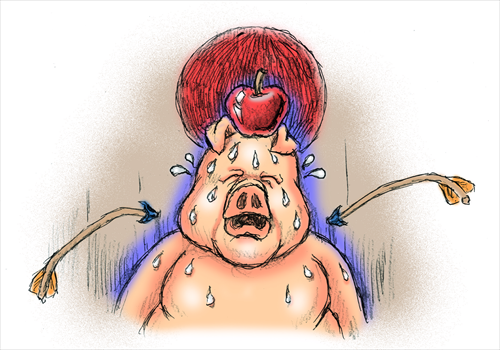HOME >> OP-ED
Abenomics on the ropes amid repeated delays of sales tax hike
Source:Xinhua Published: 2016-6-2 20:28:01

Illustration: Peter C.Espina/GT
The cabinet of Japanese Prime Minister Shinzo Abe on Tuesday survived a no-confidence motion thanks to the majority of seats secured by the Abe-led ruling bloc in the lower house of the parliament.Abe's real trouble, however, lies in the de facto failure of his economic policy, dubbed Abenomics.
Japan's household spending fell 2.9 percent in 2014 and declined 2.3 percent in 2015. Data for April showed household spending declined 0.4 percent, the consumer price index fell 0.3 percent and factory output dropped 3.5 percent from last year.
Four opposition parties, including the Democratic Party, the Japanese Communist Party, the Social Democratic Party and the People's Life Party which filed the no-confidence resolution against Abe's cabinet, are accusing Abenomics of widening the chasm between rich and poor.
They said the second delay of the sales tax hike shows the failure of Abenomics. Abe first postponed the hike from 8 percent to 10 percent in late 2014 and called for a snap general election.
In April 2014, Japan raised its sales tax from 5 percent to 8 percent, but since then, the economy has lapsed into recession.
Abe announced the latest postponement on Wednesday, this time, by two-and-a-half years.
Abenomics, first introduced in April 2013, is based upon the "three arrows" of monetary easing, fiscal stimulus and structural reforms.
One of the fundamentals of Abenomics is to issue more currency so as to depreciate the yen's value in order to improve the competitiveness of Japanese goods.
A recent national survey by Japan's Kyodo News showed that 81.4 percent of respondents did not feel any economic improvement from "Abenomics" and 64.6 percent of the Japanese public oppose increasing the sales tax rate from 8 percent to 10 percent.
As an excuse for the failure of his policy, Abe argued at a plenary session of the two-day summit of Group of Seven (G7) leaders last week that the global economy faces a looming "crisis" similar to that in 2008.
"It's irresponsible and shameless," said Japanese Communist Party leader Kazuo Shii.
"Prime Minister Abe should immediately step down," said Katsuya Okada, head of the Democratic Party. "He mishandled economic policy, and his Abenomics has failed."
Observers say Abe has his own intention to postpone the tax hike to October 2019.
It is conducive to gaining the support of voters for his party as elections for the House of Councillors, the upper legislative chamber, are to be held in July.
Furthermore, domestic consumption and investment are likely to improve in the second half of 2019 ahead of the 2020 Tokyo Olympics, so obstacles to a sales tax hike will have weakened by then.
Japan's public debt has topped nearly 240 percent of its GDP. Putting the nation's accounts in order is a priority for Abe's cabinet.
As planned, the 4 trillion yen ($36 billion) in increased revenue coming from the sales tax hike will be earmarked to help low-income elderly people and the handicapped as well as the running of kindergartens.
Japan has been trying to realize a surplus in its national accounts by 2020, but that target could only be achieved through strong economic growth and large-scale cuts in spending.
This is a commentary of the Xinhua News Agency. opinion@globaltimes.com.cn
Posted in: Voices